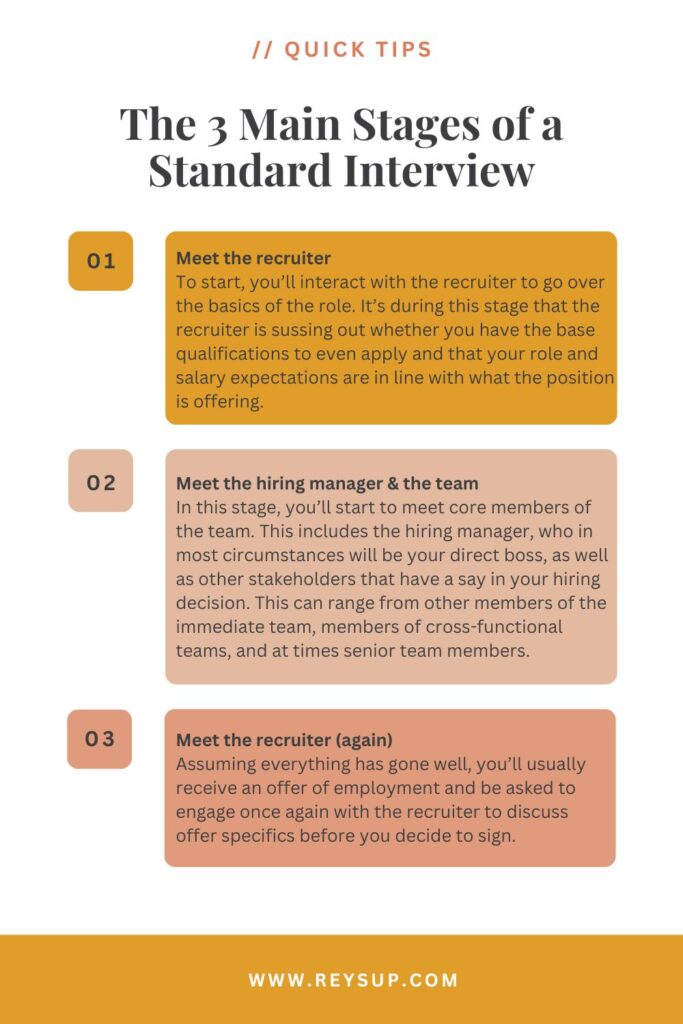In this article, we are sharing advice on how to close out an interview with confidence and sharing top questions you can ask a potential employer to ensure you make a lasting impression.

The Importance of Asking Thoughtful Questions At The End Of An Interview
Many candidates think that the interview ends when the interviewer stops asking questions, but that’s not entirely true. The interview technically ends when the allotted time slot concludes, and most companies will reserve the final 10 minutes for you to ask your own questions. That’s why when you prepare for your interview, it’s important that you also prepare the questions to ask the recruiter and the interviewer. After all, these questions you ask at the end of the session will also be ‘evaluated’ and play a role in shaping the impression you leave.
To impress the recruiter and hiring manager, you need to ensure your questions are both thoughtful and insightful, and demonstrate a deep understanding of the role and the company. These questions should highlight your enthusiasm and commitment, but also demonstrate that you understand exactly what you are signing up for. In this article, we’ll explore some impressive questions to ask at the end of an interview so you can stand out and ultimately get the job.
The Various People You Will Meet During Your Interview
Before we get into the questions that you should be asking at the end of the interview, it’s important to first define the types of people you will be meeting so you can plan accordingly. When it comes to standard tech interviews, there are quite a few people that you interact with during the process.

Stage One: The Recruiter
To start, you’ll interact with the recruiter to go over the basics of the role. It’s during this stage that the recruiter is sussing out whether you have the base qualifications to even apply and that your role and salary expectations are in line with what the position is offering. In full transparency, this phase of the interview is usually just a standard procedure to ensure that the hiring manager’s time isn’t being wasted by someone who isn’t qualified for the role.
Stage Two: The Hiring Manager & Team
Once you get past this stage, you will start to meet core members of the team. This includes the hiring manager, who in most circumstances will be your direct boss, as well as other stakeholders that have a say in your hiring decision. This can range from other members of the immediate team, members of cross-functional teams, and at times senior team members. It’s during this middle stage that most of the ‘meat’ of the interview happens. This is when you’ll engage in behavioral and situational interviews, and sometimes depending on the role technical interviews.
Stage Three: The Recruiter (again)
Once you get past this stage and assuming everything has gone well, you’ll usually receive an offer of employment and be asked to engage once again with the recruiter to discuss offer specifics before you decide to sign.
In all of the stages above, you will have the opportunity after each conversation to ask questions to the interview. Coming prepared for these end-of-the-interview question sessions is crucial for two reasons:
- You want to avoid asking the same questions repeatedly to different people
- You want to use this time to demonstrate your strategic thinking and deep understanding of the company. Essentially, it’s another chance for you to impress and showcase what you bring to the table, and you don’t want to miss the opportunity to do that.
The last piece of advice is don’t underestimate the power a recruiter has in the hiring process. I have been a hiring manager for many years, and I have seen candidate’s applications be thrown out because they were rude or non-engaging with the recruiter. Everyone you talk to from the company mattes, and you have to treat each one with the same respect and preparedness.
5 Questions to Ask the Recruiter
In this section, we will cover impressive questions to ask at the end of an interview when you are talking with a recruiter.
1. How fast are you looking to fill this role? What is the timeline?
- Reasoning: Understanding the urgency behind filling the position can provide you insight into the company’s hiring priorities and the importance of the role.
- Why Asking It Makes You Stand Out: It shows that you are serious about the position and are considering the logistics and timelines of your potential start date. It also indicates that you are ready to move forward with speed.
2. How many open roles are there on the team?
- Reasoning: This question helps you gauge the current team’s dynamics and workload, as well as how your role might fit into the larger picture.
- Why It Makes You Stand Out: Asking this question indicates that you are interested in the team’s structure and how your potential role will mesh with other positions. It shows that you are considering not just the role itself but how it affects other parts of the broader team.
Also Read Expert Tips to Email Like a Boss
3. What does compensation look like and how is it structured? Is there an opportunity to get equity?
- Reasoning: This question seeks clarity on the financial and equity aspects of the role, which are crucial for making an informed decision about the offer. It would honestly look bad if you didn’t ask this.
- Why It Makes You Stand Out: Inquiring about compensation and equity shows that you are serious about the role and indicates that you know your personal worth. It also shows that you are looking at the full scope of the offer, and not just the base salary. This in turn demonstrates that you care about long-term benefits, which indicates that you have plans to stay around awhile.
4. What do benefits look like (i.e., 401K)?
- Reasoning: Benefits are an important part of the overall comp package and can have a large impact on your overall satisfaction and financial security.
- Why It Makes You Stand Out: Asking about benefits shows that you are thorough and considering all aspects of your employment package. It reflects that you value comprehensive information before making a decision, which is a strong skills to have in any role.
5. What is the work in office / work from home policy?
- Reasoning: Understanding the company’s policy on remote work or in-office requirements helps you assess how well the company’s flexibility aligns with your personal needs.
- Why It Makes You Stand Out: This question reveals that you are thoughtful about work-life balance. This is an especially strong question for someone who is applying for a manager role, because it shows that you care about this sort of thing and will trickle that down to your team.
Questions to Ask the Hiring Manager
1. How has the go-to-market strategy shifted in the past year?
- Reasoning: This question helps you understand the company’s strategic approach, but also how often they change the strategy. These are important considerations for you, especially if you are joining a company where you are getting an equity take.
- Why It Makes You Stand Out: Asking about strategic decisions and shifts demonstrates an interest in the company’s overall direction and how it could influence you in this role. It shows that you are thinking about the broader business context and understand the importance of a solid go-to-market plan of attack.
2. How many people on the team hit quota last quarter/month?
- Reasoning: This question provides insight into the team’s performance and the potential challenges or successes you may face in the role. For example, by asking this question, you can gauge whether the goals set are overly ambitious, potentially resulting in few employees achieving their targets and employee dissatisfaction, or if the goals are too easy, indicating that the company may not be pushing its employees to reach their full potential.
- Why It Makes You Stand Out: It shows that you are focused on performance metrics and are eager to understand the team’s success and challenges. At the end of the day, it indicates a results-oriented mindset.
3. Where do you foresee the company/this team/this role in 6 months? What about in 5 years?
- Reasoning: This question helps you understand the short-term and long-term vision for the company, team, and role, and provides insight into the growth opportunities you may have if you stick around for awhile.
- Why It Makes You Stand Out: Asking about the future in this way shows that you are thinking about how you can grow within the role and company. It highlights a forward-looking attitude and a desire to build a long term career at the company, which all employers love.
4. What is the number one quality you are looking for in someone to fill this role?
- Reasoning: This question helps you understand what the hiring manager values most in a candidate. This is helpful for a variety of reasons. One, it allows you to better tailor your responses for the remaining portion of the interview based on what you know they are looking for. Two, it allows you to get a glimpse into what this person will be like as a manager and the expectations they are going to have of you in the role. And three, it indirectly uncovers a very important question around what is currently challenging on the team. Hiring managers may be reluctant to share too much information here because they want the role to seem appealing to candidates, but it’s important that you push here so you know what you are getting yourself into..
- Why It Makes You Stand Out: It shows that you care about doing well in the role and that you have a growth mindset. When people ask managers what they are looking for in a successful employee, it basically tells the manager ‘I want to do well here, tell me where to focus’.
5. What does “success” in this role look like to you?
- Reasoning: Understanding how you will be evaluated and what success in the role looks like helps you understand if you can truly to the job to be done and do it well.
- Why It Makes You Stand Out: First and foremost, this question shows that you care about delivering value to the company. It also demonstrates that you understand the importance of defining what success looks like in any project, a transferable skill that you can bring to the role itself.
6. What is the hardest part of your job?
- Reasoning: This question cuts straight to the chase and dives into the challenges of the role. You want to ask this so that hiring managers are being as transparent as possible during the hiring process.
- Why It Makes You Stand Out: It shows that you are realistic about the challenges of the role and are prepared to tackle them. It also demonstrates empathy and a willingness to work with the team to address said challenges.
7. What does the growth trajectory typically look like?
- Reasoning: Understanding the growth trajectory helps you gauge the potential career advancement opportunities within the company.
- Why It Makes You Stand Out: This question shows that you are interested in a long-term career at this company and are already considering how you can grow and excel. This is every hiring manager’s dream.
8. How do you think about competition? How do you foresee the competitive landscape shifting in the next few years?
- Reasoning: This question helps you understand the company’s competitive strategy, how they stack up in the market, and if you are joining a winning team.
- Why It Makes You Stand Out: Asking about competition shows that you are aware of general market dynamics and that you are eager to either uphold or create further differentiators when talking to customers. It’s particularly impressive if you can ask this question while naming dropping knowing competitors, because that shows you’ve done your research on the company.

In Closing
The questions that you ask at the end of the interview are just as important as the questions that you answer throughout it. Remember that everyone you talk to – recruiter, hiring manager, future team mate, executive – matters, and you have to be on your A game until you have an offer in hand. And now you know the questions to ask at the end of an interview so you stand out. All that’s left to do is put it into practice!
If you liked this article, be sure to check out our other article on acing the behavioral interview, where we share over 50 questions from real-life interviews that will get you prepared for interview day.




